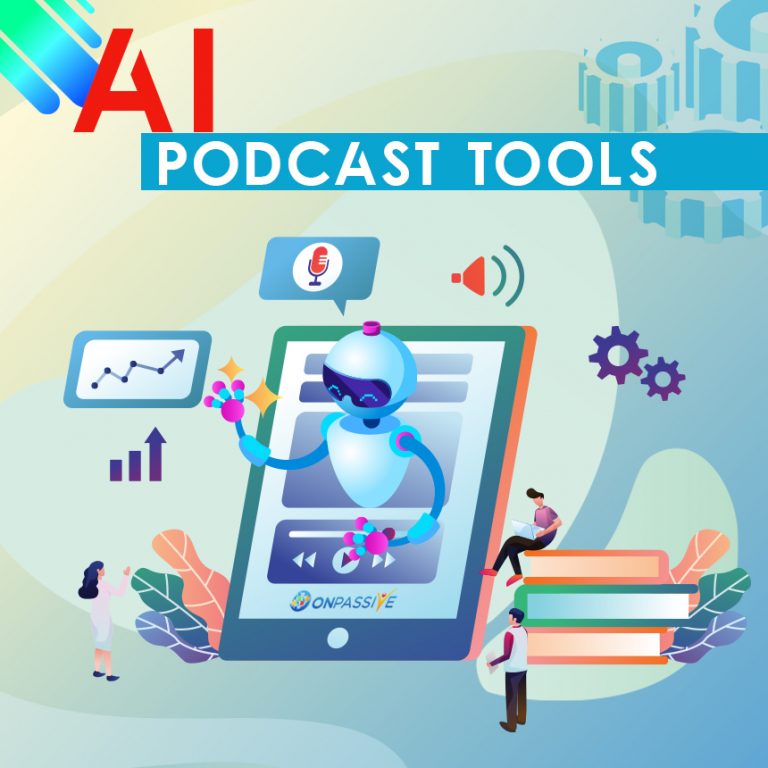
Artificial Intelligence will surely restructure the face of every modern industry. And podcasting is no different. In fact, significant changes are already fully initiated. New AI podcast tools are transforming the way some producers create or edit content.
Then what can these AI podcast tools do? How do they operate? And what impact will this tech have for the podcasting industry as it becomes more extensively available?
Related: It’s time to switch your business to ONPASSIVE AI tools!
AI Podcast Transcription
AI in podcasting isn’t something new. Automated transcription has been available for many years now. For instance, the Podcast.co platform holds an AI tool that enables you to produce full episode transcripts with just a single click.
Such characteristics have been made possible, thanks to the advancements in natural language processing (NLP) and machine learning. And while speech recognition technology isn’t 100% accurate yet, it proceeds to advance by the day.
Having comfortable access to transcripts help podcasters in plenty of ways. They are especially helpful for swiftly analyzing episode content and drafting perfect, time-stamped show notes. And with a bit of editing, automated transcripts can also be transformed into long-form blog posts, encouraging to funnel SEO traffic back to the initial episode recordings.
Related: Combining UX and SEO for a Positive Marketing ROI
Transcripts aside though, there haven’t been any other broadly-used applications for AI in podcasting. But that’s now evolving thanks to the current generation of AI tools being developed by companies.
Revolutionizing Audio Editing Through AI Voice Doubles
Numerous transcription and multimedia editing providers are redesigning the version of its audio editing software that was designed mainly for podcasters.
They include a lot of forward-thinking tools and features. Notably, it provides you with the capability to effortlessly edit audio file as simple as editing a word document. Here’s how it works:
It transforms your audio into text format, split by who’s speaking, and it then lets you manage those audio files as if you were editing a text form of the script in a word processor. Eliminate a sentence or two, and it will automatically compress the file to make the recording sound natural and smooth.
While this characteristic is no doubt remarkably useful, it was another tool that generates most interest from podcasters. Primarily because it has the potential to totally restore the conventional editing process.
It enables you to generate an AI podcast voice double that can be utilized to overdub flubbed phrases or words and can even create entirely new sentences on its own – everything in your voice.
Podcasters can encourage Overdub machine learning algorithms by going through a list of randomly produced sentences out loud. Once sufficient input data has been assembled, then it’s available to use whenever required.
Related: ONPASSIVE AI Tools That Simply Blows Your Mind
Eventually, this will make it simpler than ever before for podcasters to make revisions to their content. Most producers would cherish the capability to generate perfect audio without all the monotony of having to cut and paste from loads of various audio files.
As compared to AI podcast tools such as transcriptions, this signifies an immense leap forward in this space. And for this purpose, this technology is more likely to become commonplace within podcasting as the cost price reduces over the following years.
But one of the primary issues raised by AI software links to the issue of audio deepfakes.
The Deepfake Threat
Deepfakes are fraudulent audio or video recordings that sound and look just like the actual thing.
Nowadays, pretty much anyone can get their hands on deepfake software and produce convincing fraudulent audio clips in their free time.
Related: 12 Mind-Blowing Things Artificial Intelligence Can Do
The Podcast That AI Built
Moving past of just improving the podcast editing process, others are working to completely outsource podcast content generation to AI.
Every time someone listens, they’ll start by typing a random number into a website. This will start a chain of calculations that will generate relationships, characters, betrayals, jealousies, and perhaps even a murder or two.
These plot points are then converted into a text narrative, read loudly by a voice synthesizer, and zipped up into an audio file. That’s the intention anyway. But it’ll require a few years before these kinds of AI-generated podcasts to reach adulthood.
Simple as it is, this evidence of theory allows a short preview of the future. AI-generated podcasts like this will continue to progress over the following years. Yet whether they will really catch on remains to be seen.
The Future of AI Podcast Tools
It’s difficult to believe that large numbers of people will relish tuning to podcasts produced by machines. The experience may appear rather soulless. Storytelling is a unique human art, and it seems likely it’ll stay that way.
If that’s the case, then the technology will just become an exciting curiosity. But it’ll be an impressive podcasting progression nonetheless.


